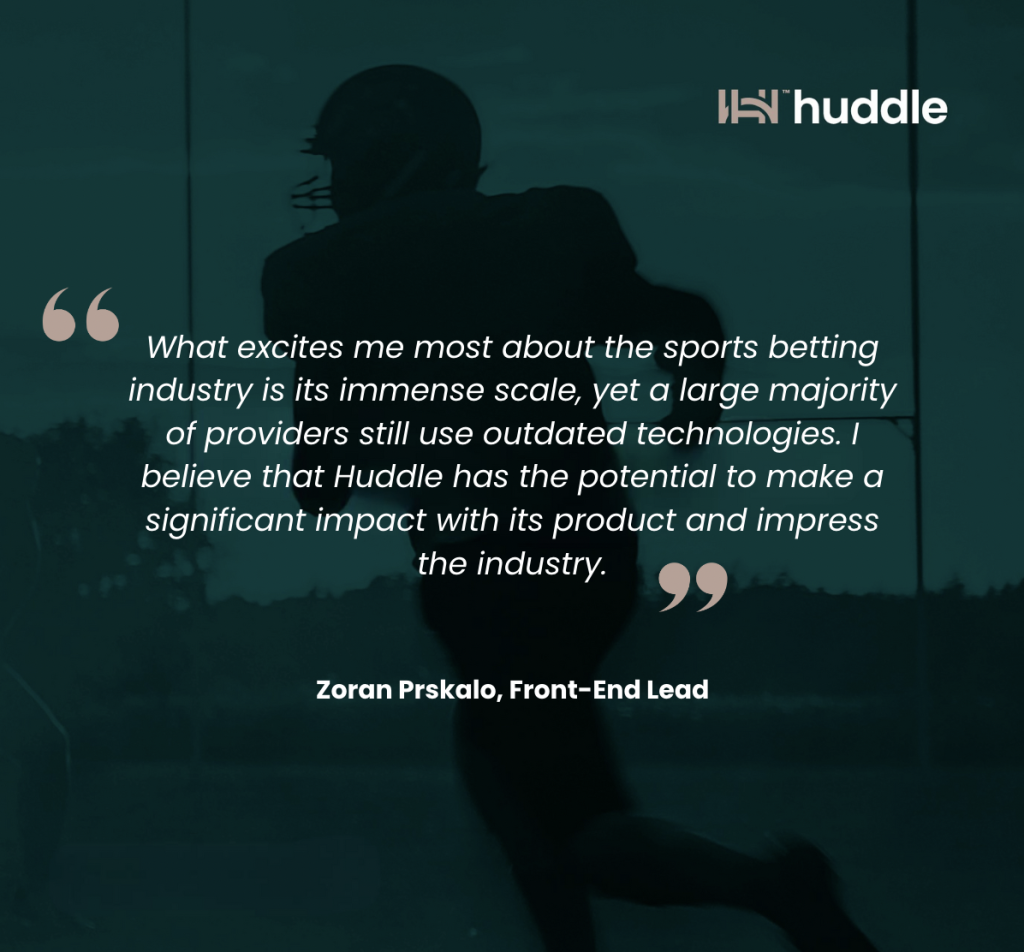
Meet The Team: A Q&A With Huddle’s Front-End Lead, Zoran Prskalo
Blog
Meet The Team: A Q&A With Huddle’s Front-End Lead, Zoran Prskalo
At Huddle, Zoran leads a team that consistently pushes the boundaries of what's possible in sports betting technology. He’s driven by a passion for innovation, performance optimization, and creating seamless user experiences. Today, Zoran will share insights into the exciting work his team is doing and how the frontend plays a pivotal role in Huddle's product success and future growth.
Can you tell us a bit about your career journey and how you became the Frontend Lead at Huddle? What drew you to the sports betting industry?
My journey to becoming the Frontend Lead at Huddle began after completing my master’s degree in computer science. Initially, I aimed for game development, as gaming has been a big part of my life. However, after discovering web development, I shifted my focus. I landed my first frontend job building an AngularJS-based app that’s still in use today.
Later, I joined NSoft, a renown sports betting company, where I honed my skills in JavaScript, AngularJS, React, and Vue, as well as backend technologies like Node.js and Python. There, I gained deep insights into the sports betting industry and became the go-to problem solver, which set the stage for my role at Huddle. When the opportunity to lead their frontend team arose, I couldn’t resist the challenge.
I believe that a frontend developer should have a bit of OCD and a keen eye for detail, which naturally drew me toward the frontend side of applications. Though the sports betting industry found me through NSoft, it’s a natural fit, given my passion for sports.
Since Huddle primarily focuses on American sports, I'm excited to learn something new every day about sports I hadn’t previously had the opportunity to follow and understand. Through my current job, I’m increasingly grasping why Americans are so passionate about American football, baseball, and hockey.
What excites me most about the sports betting industry is its immense scale, yet a large majority of providers still use outdated technologies. I believe that Huddle has the potential to make a significant impact with its product and impress the industry.
How does Huddle’s focus on innovation in sports betting influence the work you do on the frontend?
Focusing on innovation means that, as a frontend team, we must develop solutions that have not been implemented in the industry before. This provides us with greater creative freedom as we search for solutions to unprecedented challenges.
Working closely with traders, who have a deep understanding of the industry, helps us continuously improve the user experience. They provide us with constant ideas for new features that enhance our product. Additionally, the vast experience of our leaders and developers in the sports betting industry results in new ideas that elevate our product to a higher level daily.
As our product grows rapidly and innovations bring new challenges to development, the main focus of the frontend team is optimizing application performance. Ultimately, with all the innovations and core features, the most important aspect is that users have the best and fastest experience while using our platform. This is where the frontend team truly shines.
Can you walk us through a recent successful project that you and your team worked on, and explain its significance for Huddle?
As Huddle is still in a startup mindset, we are delivering new features almost daily. Projects that typically require months of work are developed in just a few weeks thanks to our experience. Over the last three months, I could list numerous projects of significant importance to Huddle, but I will highlight a few: the Risk Management tools: Bet Ticker, Liability Monitor, Audit Log, and Customer Profiling. These have all been developed in a very short time and assist Huddle in its most sensitive operational areas.
Given that Huddle expands its market offerings almost daily with new micro markets and player props, I particularly want to emphasize the market configuration project we developed collaboratively with our backend team. This project allows us to automatically launch new markets through simple configurations, eliminating the need for additional frontend work. Additionally, through the same configuration, users can modify the display and behavior of markets during various stages of a match, significantly easing the workload for our traders.

What unique challenges does building a frontend for a sports betting platform present?
One of the significant challenges in building a successful sports betting platform is constructing pages with a vast number of elements while maintaining high application performance.
For example, consider a trading event screen, where we need to display all the information about a match, including statistics, scoreboard, play-by-play updates, all markets for that match, and numerous configurable components that can update during the event. Given that a single match can have 1,000 or more markets at any given time, which are constantly updating along with the match state itself, our task is to ensure that traders experience absolutely no downtime or difficulties trading the match due to frontend application performance.
We have designed our platform to utilize lazy loading as much as possible, ensuring that it doesn't matter whether an event has 1 market or 1,000; performance will remain consistent.
Another important challenge to mention is that due to the constant addition of features and new markets, the entire product needs to be fully configurable through our back office. This allows a support operator to address any request with just a few clicks.
What do you consider the most important aspect of building a strong and collaborative development team?
To build a strong and collaborative development team, multiple factors come into play. However, I believe one of the most important factors is finding people who are compatible with each other. I have always said that I would rather work with someone I can share a coffee with, joke around, and discuss work or everyday problems than with someone who feels completely different from me.
The next important factor is responsibility, which I consider one of the greatest virtues of humanity. If you give a responsible person freedom and simply guide them toward a goal, there’s no fear of encountering problems with that individual.
Open communication is also crucial. Every—or almost every—issue can be resolved promptly if it’s communicated effectively. It’s essential to emphasize at the beginning how important communication is and to assure team members that all doors are always open for it.
Knowledge sharing has significantly helped me in my career in previous teams, so I make it a point to share anything new I learn with my colleagues immediately.
I have always regarded regular feedback (positive or constructive) from the team lead, as well as from team members to the lead, as one of the essential factors.
From day one, we established rules for coding and behavior, and although our team is handpicked from the first to the last member, everyone has the freedom to bend the rules and add a bit of their own personality to our product.
It’s hard to decide which is the most important aspect of building a strong and collaborative development team, but I recognize all these factors in the members of my frontend team. I am proud of the unity and willingness to help each other that everyone demonstrates, which I believe makes us a strong unit.
Subscribe below and get the latest straight to your inbox!















